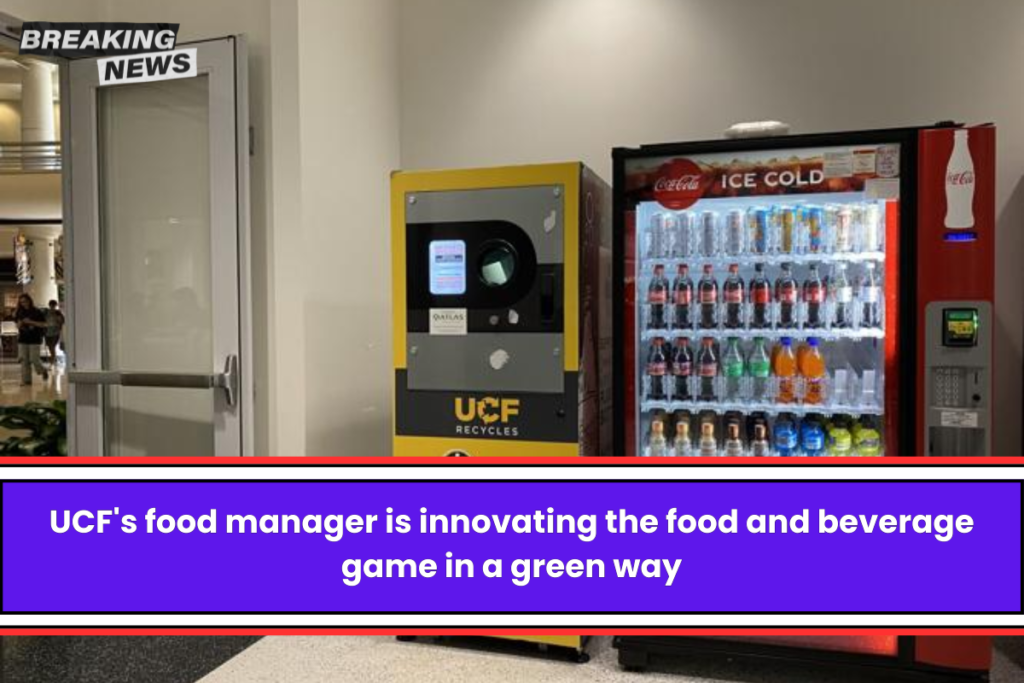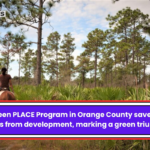As senior manager of food and beverages at UCF Business Services, Scotti Willis is always coming up with new ideas for UCF. For example, she has brought in recycling tools and technology to cut down on leftovers.
Willis said that he is in charge of the school vending machines and food and drink contracts. He told them they had to go through him if they wanted to have an event on campus with food.
Willis said that one of the new things he is working on is getting the university’s providers to offer more services for people who are blind or have low vision.
Willis said, “In the spring semester, in the Student Union, on the kiosk, you will see a navigation bar that you can use to move through the menu. You can also plug in a headphone jack and the menu will talk to them.”
Willis said that before he chooses which companies to work with, he checks to see how much work they can handle.
Willis said, “You can not come from a bunch of small schools with maybe 5,000 students and think you can run this school with 70,000 students.”
Willis said that the profit is used to keep coming up with new ideas at UCF. For example, it helps with facilities, sports, different offices, and Student Success Services.
“We also know how much Coca-Cola is giving,” Willis said.
There is a form on the UCF Business Services website that groups like clubs, the Rosen College, and Student Government can use to get in touch with him and ask for free drinks to use at their events.
Willis said he has worked in hospitality and business for more than twenty years. He said that he started his job as a dishwasher at Embry-Riddle Aeronautical University and worked his way up to being in charge.
Willis said that he then took over an account at Bethune-Cookman University after leaving Embry-Riddle.
He then said that Willis moved to the Georgia Institute of Technology to be in charge of three eating halls. Based on a survey of students, he made them the top three places to eat on campus.
Willis was then hired by Microsoft to run a new building in midtown Atlanta. The building has eight stations, such as a food court with a full-service bar and restaurant, two levels of catering, and a program that gives workers free coffee and drinks.
He said that Willis then helped Compass make purchases, like taking over a private school called The Walker School.
After that, Willis said, he was hired by UCF to make sure the school gets the most for its money.
Willis said that this included bringing Raccoon Eyes to ’63 South. This is a 3D camera driven by artificial intelligence that is used to find out how much food is left over and how heavy it is.
It is placed above the tray return in the dining hall. Willis said that it takes a picture of each extra on a plate so that you can see how much of each food is left over.
Willis said, “You can talk to the live interactive screen, and it gives the chefs analytics so they can get a report every month.” “If 80% of people say they did not like the rice, we change the recipe or find something else.”
Willis said that about 2,500 students have food plans. To get more of those students, he wants to get them things they like so that the team can see that number rise.
According to Willis, Raccoon Eyes is only in ’63 South right now. But, the team will look at the data at the end of the service agreement to decide if it will be used in Knightro’s or not.
Willis said the system worked well enough because they tested it during the summer term to see if it was worth the money by getting to this point. Willis said that it was in the end because the kids liked it and used it.
Willis told them that they can even suggest changes to the menu, like putting cheese on the veggies or getting a bigger or smaller serving.
Willis also said that UCF has a relationship with O-Town Compost that lets the food scraps be put on a conveyor belt and into a compost bin instead of a trash dump. This is because UCF wants to reach a zero-waste goal.
Willis said, “Since March to October, we have changed 19 tons.” “Another thing that will happen in the spring is that the Student Union and Knightro’s will be added to the compost program.”
Willis said that when a student’s plate goes through the tray, service workers on the other side of the wall scrape the food into a waste bin. He also said that the people who work in the kitchen cut up meat scraps, fruit peels, lettuce heads, and other things that get put in the waste bins.
Ivan Zou, a computer engineering graduate of the Georgia Institute of Technology, said that between 1,000 and 1,500 people eat in the eating halls every day, and between 7,000 and 8,000 plates are served from Monday to Friday. He said that it is about 4,000 to 5,000 plates on the weekends.
“One time I was in the kitchen and saw a worker pushing a cart full of food that she was just throwing away,” Zou said. “Seeing food go to waste really moved me to do something about it because I care a lot about food.”
Willis also said that he is in charge of the Coca-Cola vending machines and that he has been working closely with Coca-Cola on the plan to put in reverse vending machines as part of efforts to make the school more environmentally friendly.
Willis said that the machine collects cans and boxes of Coca-Cola products that can be recycled.
At the moment, Willis said, there are reverse vending machines in the Arena and on the first floor of the Student Union. “We just finished a site survey with Coca-Cola to add another machine in the lobby of the Teaching Academy. It will be here soon.”
Willis said that when he and Coca-Cola workers looked at the analytical data, the machine having to be inside a building made sense because of all the people who walk by there.
Willis gave a report on September 30 and a contract that starts on July 1, 2024, which both say that 918 units of Coca-Cola product cases have been returned between the two machines.
The monthly report from the recycling machine says that the school gets five cents back for every bottle that is brought back.
He was born in Trenton, NJ, but Willis said he grew up in Daytona Beach, FL.
Willis said that he just graduated from Daytona State College with an associate degree in business administration. He plans to continue his business bachelor’s degree at UCF next fall, along with his two kids, who also plan to transfer to UCF.
Willis said that his family and his job pulled him back to Florida because all of his family lives in Florida and raising his children in Georgia would mean being away from them.
When Willis decided to take this job, one thing that stood out to him was how long the people he met had been working here. He said that hearing about people who had worked at UCF for seven, ten, or fifteen years made him want to grow there too.


